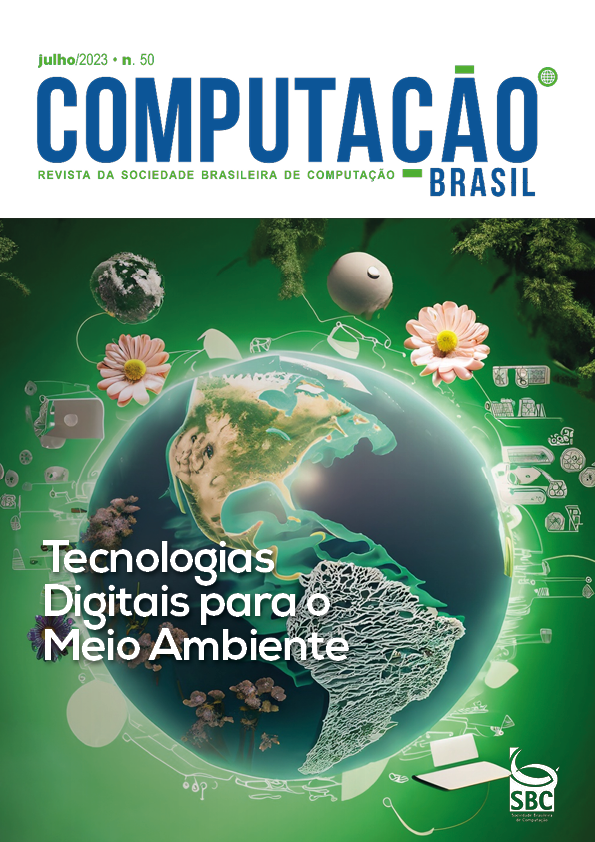Força-Tarefa da SBC: Digital Twin BR - a computação a serviço do planeta
DOI:
https://doi.org/10.5753/compbr.2023.50.3926Keywords:
Mudança climática, tecnologia digital, gêmeo digital, Internet das Coisas, ciência aberta, compartilhamento de dadosAbstract
A Sociedade Brasileira de Computação (SBC) estabeleceu uma força-tarefa visando fornecer diretrizes para a aplicação das tecnologias digitais em prol da sustentabilidade do planeta. Este artigo resume o Manifesto elaborado pela força-tarefa da SBC, que iniciou em 9 de setembro de 2021 e realizou reuniões semanais para discutir e debater esforços nacionais e internacionais relacionados ao tema. O documento aborda os principais desafios enfrentados na utilização das tecnologias digitais para combater as mudanças climáticas e propõe ações que podem ser adotadas pelos governos e pela sociedade visando ao desenvolvimento e à aplicação dessas tecnologias no enfrentamento das mudanças climáticas.
Downloads
Referências
Nativi S, Mazzetti P, Craglia M. Digital Ecosystems for Developing Digital Twins of the Earth: The Destination Earth Case. Remote Sensing. 2021; 13(11):2119. https://doi.org/10.3390/rs13112119
Arias, P.A. et al. Climate Change 2021 (Technical Summary): The Physical Science Basis. Contribution of Working Group I to the Sixth Assessment Report of the Intergovernmental Panel on Climate Change. Cambridge University Press, Cambridge, United Kingdom and New York, NY, USA, 2021, pp. 33−144. https://doi.org/10.1017/9781009157896.002,
Medeiros, C. Ciência Aberta - Colaboração sem barreiras para o avanço do conhecimento. SBC Computação Brasil (O Papel da Computação na Ciência Aberta), Número 46, Dezembro 2021. [link]
UNESCO. Recommendation on Open Science. United Nations Educational, Scientific and Cultural Organization, Paris, France, 2021. Document SC-PCB-SPP/2021/OS/UROS: [link]
UNESCO. Preliminary study of the technical, financial and legal aspects of the desirability of a UNESCO recommendation on Open Science. In UNESCO General Conference, 40th, 2019. [link]
Wilkinson, M., Dumontier, M., Aalbersberg, I. et al. The FAIR Guiding Principles for scientific data management and stewardship. Sci Data 3, 160018 (2016). https://doi.org/10.1038/sdata.2016.18
Bauer, P., Dueben, P.D., Hoefler, T. et al. The digital revolution of Earth-system science. Nature Computational Science 1, 104–113 (2021). https://doi.org/10.1038/s43588-021-00023-0
Royal Society. Digital technology and the planet: Harnessing computing to achieve net zero. The Royal Society, 2020. ISBN 978-1-78252-501-1. [link]
B. R. Barricelli, E. Casiraghi and D. Fogli. A Survey on Digital Twin: Definitions, Characteristics, Applications, and Design Implications, in IEEE Access, vol. 7, pp. 167653-167671, 2019, https://doi.org/10.1109/ACCESS.2019.2953499.
Chantry M, Christensen H,Dueben P, Palmer T. Opportunities and challenges for machine learning in weather and climate modelling: hard, medium and soft AI. Phil.Trans.R.Soc. A379: 20200083, 2021. https://doi.org/10.1098/rsta.2020.0083
Bauer, P., Stevens, B. & Hazeleger, W. A digital twin of Earth for the green transition. Nature Climate Change. 11, 80–83 (2021). https://doi.org/10.1038/s41558-021-00986-y
Força-Tarefa da SBC Digital Twin BR: a computação para o planeta. Outubro, 2021. [link]
Downloads
Published
Como Citar
Issue
Section
Licença

Este trabalho está licenciado sob uma licença Creative Commons Attribution-NonCommercial 4.0 International License.


